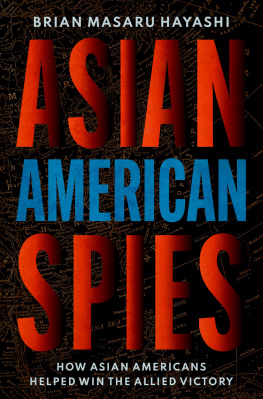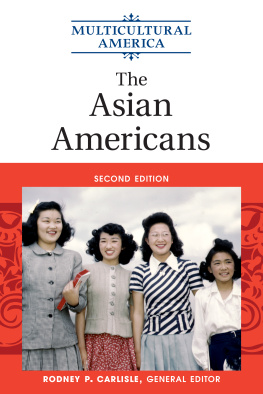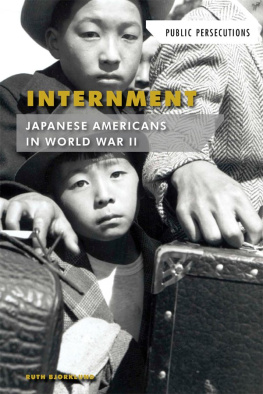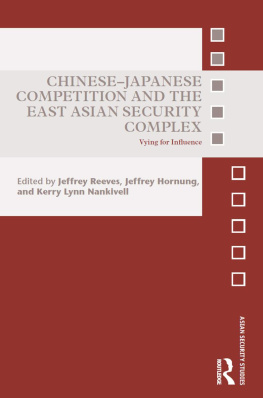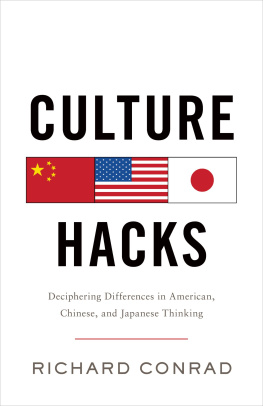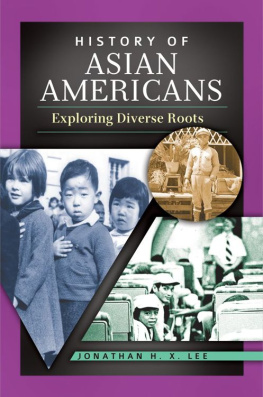Asian American Spies

Oxford University Press is a department of the University of Oxford. It furthers the Universitys objective of excellence in research, scholarship, and education by publishing worldwide. Oxford is a registered trade mark of Oxford University Press in the UK and certain other countries.
Published in the United States of America by Oxford University Press
198 Madison Avenue, New York, NY 10016, United States of America.
Oxford University Press 2021
All rights reserved. No part of this publication may be reproduced, stored in a retrieval system, or transmitted, in any form or by any means, without the prior permission in writing of Oxford University Press, or as expressly permitted by law, by license, or under terms agreed with the appropriate reproduction rights organization. Inquiries concerning reproduction outside the scope of the above should be sent to the Rights Department, Oxford University Press, at the address above.
You must not circulate this work in any other form and you must impose this same condition on any acquirer.
Library of Congress Cataloging-in-Publication Data
Names: Hayashi, Brian Masaru, 1955 author.
Title: Asian American spies : how Asian Americans helped win
the Allied victory / Brian Masaru Hayashi.
Other titles: How Asian Americans helped win the Allied victory
Description: New York, NY : Oxford University Press, [2021] |
Includes bibliographical references and index.
Identifiers: LCCN 2021001784 (print) | LCCN 2021001785 (ebook) |
ISBN 9780195338850 (hardback) | ISBN 9780190092863 (epub) |
ISBN 9780190092856
Subjects: LCSH: World War, 19391945Secret serviceUnited States. |
World War, 1939-1945Participation, Asian American. | Asian American
spiesUnited StatesHistory20th century. | United States. Office of
Strategic ServicesHistory. | World War, 19391945Propaganda. |
Propaganda, AmericanAsiaHistory20th century.
Classification: LCC D810.S7 H38 2021 (print) | LCC D810.S7 (ebook) |
DDC 940.54867308995dc23
LC record available at https://lccn.loc.gov/2021001784
LC ebook record available at https://lccn.loc.gov/2021001785
DOI: 10.1093/oso/9780195338850.001.0001
For Yumei Song and Esther Yumi Hayashi
Contents
This book began years ago as part of a chapter for another book. However, finding a wealth of primary sources and a dearth of secondary materials, I expanded this project and, in the process, multiplied the number of people who helped make this book possible. At the early stages of the book, certain knowledgeable individuals encouraged me along the way, providing information, leads, and tips in the form of interviews that proved invaluable for this project. The Japanese American Veterans Association members, and Terry Shima and Grant Ichikawa in particular, provided a contact list of potential interviewees, some of whom appear in this book. Father Richard Kim and his brother Arthur, too, supplied me with many stories and insights about their family and life in prewar Shanghai that intersected with my work on the OSS. Dick Hamada, Maggie Ikeda, Shirley Chun-Ming, and Howard Furumoto opened their homes to me and allowed themselves to be interviewed about their involvement or their family members role in the OSS. Debra Thurston, Hai and Tramh Le, and Ty and Loan Nguyen, all friends of mine, helped by putting this vagabond researcher up overnight as he explored the archives of key libraries in their area.
As the search for Asian Americans in the OSS expanded, my dependence on archivists and librarians enlarged to include a considerable number of specialists. At the National Archives and Records Administration II in College Park, Maryland, I received guidance from Larry MacDonald regarding the OSS records that he and a host of volunteers processed and organized after the CIA released them. The late John Taylor was especially helpful in pointing out the largely untapped Shanghai Municipal Police records the CIA pulled out of China before 1949. Nathan Patch, William Cunliffe, and Eric van Slander devoted an enormous amount of their time to track down personnel records of various individuals within the office. Jennifer Cole and Tad Bennicoff of the Seeley-Mudd Library at Princeton University, and Peggy Dillard of the George Marshall Library in Lexington, Virginia, went above and beyond the call of duty by locating and copying documents related to William Lockwood and Peter Kim. Naoki Kanno, senior fellow at the Military Archives Center for Military History at the National Institute for Defense Studies in Tokyo, was quite helpful in my search through various materials. Susan Hammond, director of the War Legacies Project and John McAuliffe, founder and director of the Fund for Reconciliation and Development, searched through their transcripts related to Mac Shin and Frank Tans activities in Vietnam.
Other archivists and librarians who were generous with their time included Robert Tam of the Chinese Historical Society Archives in Honolulu, Marjorie Lee of the UCLA Asian American Studies Reading Room, and Sherman Seki of University of Hawaii, Manoa. In tracking down the social scientists who worked with Asian Americans in the OSS, Timothy Driscoll of the Pusey Library at Harvard University, Susan Irving of the Rockefeller Archives Center, Susan Jania of the Bentley Historical Library at the University of Michigan, David Sun and Carole Leadenham of the Hoover Institution of War and Peace at Stanford University, and Anne Watanabe, Octavio Olvera, Simon Elliott, and Jeffrey Rankin of Special Collections at the UCLA Library were all extremely accommodating during my long perusals of their materials.
The extensive research behind this book would not have been possible without financial assistance or independent wealth. Lacking the latter, I was able to complete this project with the former. The Mitsubishi Foundation generously provided me with funds that allowed me to cross-check OSS materials against the Special Operations Executive records held at the National Archives in London and the Guomingdang records at the National Archives in Xindian City, Taiwan. The Japanese Ministry of Culture, Education, and Sports amply supplied me with research grants over portions of this project that paid for much of the high cost of traveling and lodging in so many different locations where the documents were deposited. In addition, my previous academic home, the Graduate School of Human and Environmental Studies, Kyoto University, supplied general financial assistance with the high cost of copying and equipment during the writing of this book. Henry Choi, Sonia Kim, and Aki Yamamoto helped me locate certain documents in Japanese and Korean languages. Anran Wei assisted with some of the translation of the Chinese-language materials, as did Jinhee Kwon, who ably assisted me when I went to inspect the Syngman Rhee Presidential Papers at Yonsei University in Seoul, Korea. Shtar Shindo and Shinichi Itagaki, as usual, provided valuable hints and insights from their own research which immeasurably help improve this manuscript. Funding from the Department of History, Kent State University, where I now have settled, was also helpful.
Special thanks goes to individuals who helped make the manuscript better. Susan Ferber, editor, provided many insightful comments, suggestions, and corrections, making this manuscript far more readable than it had been before. Lon Kurashige, Valerie Matsumoto, Yasuko Takezawa, and Rumi Yasutake gave invaluable advice along with opportunities to present portions of the research at their conferences.

